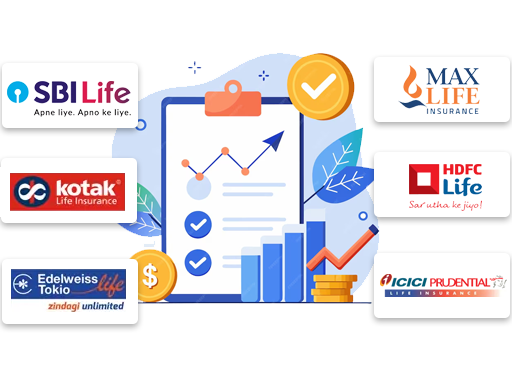- Age Limit In Life Insurance
- Why Age Restriction?
- Tips To Buy Life Insurance

Himanshu is a content marketer with 2 years of experience in the life insurance sector. His motto is to make life insurance topics simple and easy to understand yet one level deeper for our readers.
Reviewed By:

Anchita has over 6 years of experience in content marketing, insurance, and healthcare sectors. Her motto to make health and term insurance simple for our readers has proven to make insurance lingos simple and easy to understand by our readers.
Updated on Mar 18, 2025 4 min read
What is the Age Limit for Life Insurance?
Life Insurance age limit is the age bracket in which an individual can purchase a life insurance policy for themselves or their loved ones. The life insurance policy age limit is between 18 to 65 years. The minimum age to buy a life insurance policy is 18 years whereas the maximum age is 65 years. However, certain insurance companies and plans have different age limits.
Buying a life insurance policy early in life offers the benefits of low premiums as the risk associated with insuring you is low. You can buy a life insurance policy with a 1 crore sum assured starting at monthly premiums of just Rs 500.
What is the Life Insurance Maximum Age Limit?
The maximum age limit to buy a life insurance plan is 65 years. Various life insurance plans such as senior citizen term insurance plans are available that offer a higher entry age limit. But these plans come at a high premium cost. That’s why it is important to buy a life insurance plan early in life.
Several life insurance companies in India offer lifelong protection through whole life insurance policies till 99 years of age. The premiums for a whole life insurance policy are higher than a normal term life insurance plan.
Why Should You Buy Life Insurance Early?
A life insurance policy provides financial protection to your loved ones in case of your uncertain death during the policy tenure. It ensures that your family is financially stable in case something happens to you. There are various reasons for buying a life insurance plan early in life.
Affordable Premiums
You can buy a term insurance plan at affordable premiums in your early 20s as the risk associated is low. As your age increases, the premiums for your life insurance also increase. That’s why financial advisors always recommend to buy a life insurance plan early in the life.Longer Coverage
Buying a life insurance plan early allows policyholders to avail of coverage for a long duration. You can live your life peacefully as your loved ones will be financially secure even in your absence.Customization Options
The policyholder enjoys more customization options in case of buying life insurance early in their life. They can enjoy various benefits including choosing add-ons, changing sum assured, etc.Tax Benefits
You can avail of tax exemptions on the premiums paid for your life insurance policy under Section 80 (C) of the Income Tax Act, 1961. Moreover, the death benefits received are also tax-free under Section 10(10D).Peace of Mind
Buying a life insurance policy provides you peace of mind as your loved one is financially covered even in your absence. This helps you focus on your career and other important things in life.
How to Choose the Best Life Insurance Policy?
To choose the best life insurance policy you must remember certain things:
- Check the CSR of the insurance company from which you are buying the life insurance policy to make sure that your family can receive the claim amount without any hassle.
- Choose only necessary riders with your life insurance policy as each rider increases your premium amount.
- Check customer testimonials and reviews before buying a life insurance plan as it gives you a better overview of the plan you are considering buying.
- Pay your premiums timely to avoid policy cancellation.
- Compare various life insurance plans and choose the one that best aligns with your financial goals.
- Never hide any crucial information from the insurer at the time of policy purchase. Hiding any important detail or providing misleading information may lead to your claim rejection.
- Choose a life insurance policy whose premiums fit your budget.
Conclusion
The age limit for life insurance in India is 18 to 65 years. However, you must buy a life insurance policy early in life to make sure your loved ones are financially taken care of in your absence. Buying a term insurance early offers various benefits including economical premiums, longer plan coverage, multiple flexibility options, peace of mind, etc.
If you are still confused about which life insurance policy is right, you can contact us at PolicyX.com. We offer No Spam, No Gimmicks and Only Expert Insurance Advice.
FAQs: Age Limit For Life Insurance
1. Is there an age limit to buy life insurance?
Yes, the age limit to buy a life insurance policy is 18 to 65 years.
2. How does age affect life insurance premiums?
Youngеr adults gеnеrally pay lowеr prеmiums duе to bеing pеrcеivеd as lowеr risk. As you agе, thе possibility of hеalth issuеs incrеasеs, which can rеsult in highеr prеmiums.
3. Can I get life insurance if I’m 75 years old?
Yes, certain life insurance companies allow individuals 75 years of age to buy life insurance.
4. What is the maximum age limit for life insurance?
The maximum age limit for life insurance is 65 years.
5. What is the age limit for LIC life insurance policy?
The age limit for LIC Life Insurance Policy is 18 to 65 years.
6. Can I avail of additional riders with my life insurance policy?
Yes, you can avail of additional riders with your life insurance policy.
Life Insurance Companies
Share your Valuable Feedback
4.6
Rated by 858 customers
Was the Information Helpful?
Select Your Rating
We would like to hear from you
Let us know about your experience or any feedback that might help us serve you better in future.


Written By: Himanshu Kumar
Himanshu is a seasoned content writer specializing in keeping readers engaged with the insurance industry, term and life insurance developments, etc. With an experience of 2 years in insurance and HR tech, Himanshu simplifies the insurance information and it is completely visible in his content pieces. He believes in making the content understandable to any common man.




















Do you have any thoughts you’d like to share?